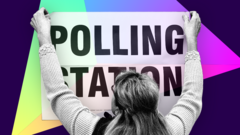12 minutes ago
About sharing
After widespread speculation, Prime Minister Rishi Sunak has announced a general election for 4 July.
In January, he said he expected to go to the polls “in the second half” of 2024.
How often are general elections held and who decides?
The latest a Parliament can be dissolved for a general election is on the fifth anniversary of the day it first met.
For the current Parliament, that date is 17 December 2024.
However, 25 working days are then allowed to prepare for the election.
So the next election had to be held by 28 January 2025.
The prime minister can call the election at a time of their choosing, within the five-year period.
Mr Sunak became prime minister on 25 October 2022 when he succeeded Liz Truss.
How does the prime minister call a general election?
The PM formally asks the King to “dissolve” Parliament – the official term for closing Parliament ahead of an election.
Rishi Sunak is the second prime minister of King Charles’s reign
At the point of dissolution, MPs lose their status, and have to campaign for re-election if they wish to carry on.
Government also enters a pre-election period – previously known as “purdah” – which restricts ministerial and departmental activity during the campaign.
More than 100 MPs have said they intend to stand down at the next election.
These include Northern Ireland Secretary Chris Heaton-Harris, former Prime Minister Theresa May, former Cabinet minister Dominic Raab and former deputy Labour leaders Dame Margaret Beckett and Harriet Harman.
Who can vote in a general election?
Anyone on the electoral register aged 18 or above on polling day can vote in the general election as long as they are a British citizen, a qualifying Commonwealth citizen or a Republic of Ireland citizen with a UK address.
All UK citizens who live abroad can register to vote in the constituency where they were previously on the electoral roll as long as they are not legally excluded from voting.
You can register to vote at any time if you are 16 or over – or 14 or over in Scotland.
Will I need photo ID to vote at the general election?
Yes. Since May 2023, voters have to show a valid form of photo ID at polling stations to vote in person at a general election.
There are 22 acceptable forms of ID, including:
passports
driving licences
Older or Disabled Person’s bus passes
Oyster 60+ cards
You can use out-of-date photo ID as long as you look the same.
Alternatively, anyone registered to vote without the correct ID – or who no longer looks like their photo – can apply for a free document called a Voter Authority Certificate.
Voters in Northern Ireland can use the Electoral Identity Card.
No ID is needed to vote by post.
How is the general election decided?
The UK is divided into 650 areas, called constituencies. Each of these elects an MP to represent local residents in the House of Commons.
On election day, registered voters in each constituency vote for their preferred candidate in their local polling station. Some people vote by post in advance.
Most candidates represent a political party, but some stand as independents.
In a general election, each person has one vote. Under the “first past the post” system, the candidate who gets the most votes becomes the MP for that area.
The election will be fought on new constituency boundaries, redrawn to reflect population changes and to try to even out voter numbers in each area.
Use our tool to find out which constituency you are in and an estimate of what the result would have been had these new boundaries been in place at the last general election, in 2019.
New boundaries: What is happening to my constituency?
Network connection lost.
Please check your connection.
After the votes have been counted, the King asks the leader of the party with the most MPs to become prime minister and to form a government.
The leader of the party with the second highest number of MPs becomes the leader of the opposition.
If no party ends up with a majority of MPs – meaning it cannot pass legislation with just its own MPs – the result is a hung Parliament.
At this point, the largest party might decide to form a coalition government with another party or operate as a minority government, relying on votes from other parties to pass any laws.
